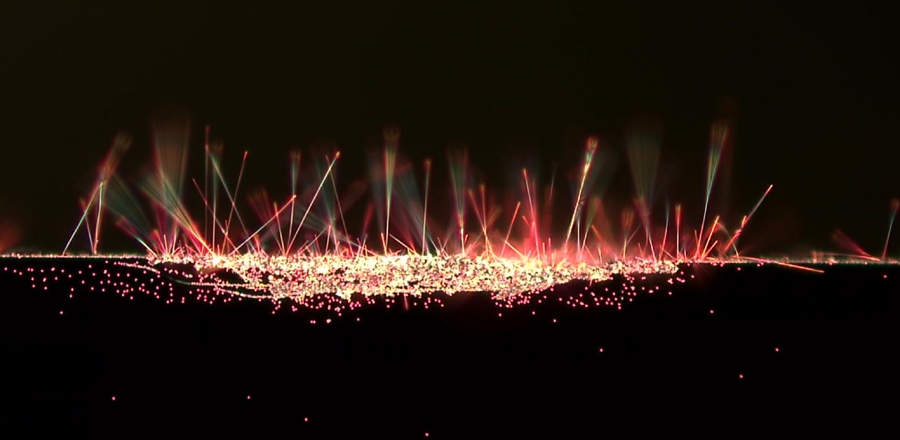FAYETTEVILLE, Ark. – Physicist Hugh Churchill has received a Faculty Early Career Development Award of $545,241 from the National Science Foundation to further his research on nanowires with electrical and magnetic properties that show promise in the next generation of digital technology, solar energy and quantum computing.
Commonly known as a CAREER award, the prestigious grant progam supports early career faculty who have the potential to serve as academic role models in research and education. Faculty at the University of Arkansas received nine CAREER awards in 2018, ranking 15th in the nation.
Churchill, an assistant professor of physics in the J. William Fulbright College of Arts and Sciences, is studying 100-nanometer-wide nanowires made up of spiraling chains of either selenium or tellurium. The unique structure of these chains allows them to produce unusually large magnetic fields, which could be used for spintronics, or in technology powered by magnetic properties rather than electronics.
Selenium and tellurium also belong to a recently discovered category of materials called topological quantum materials, that have unique properties. Selenium and tellurium’s topological properties make them extremely good at carrying electricity, because electrons traveling through these materials behave as if they have no mass. In addition, the topological characteristics of these materials could make them capable of producing a qubit — the basic element of quantum computing — which is extraordinarily stable.
Churchill and his research team plan to combine their expertise in quantum devices and two-dimensional materials to study the electronic, magnetic and quantum topological characteristics of selenium and tellurium.
“It’s exciting to me that these elements have both been known for over 200 years, but now we are in a position to reveal their character as topological quantum materials,” said Churchill. “Though this is a single investigator award, I benefit immensely from a larger team of physics and engineering faculty investigating these materials, as well as from the efforts of students whose work laid the foundation for this new project.”
The work in Churchill’s group is part of a broader research effort on campus investigating selenium and tellurium nanostructures that includes Greg Salamo, Jin Hu and Salvador Barraza-Lopez from the Department of Physics and Fisher Yu from the Department of Electrical Engineering.
About the J. William Fulbright College of Arts and Sciences: Fulbright College is the largest and most academically diverse unit on campus with 19 departments and more than 30 academic programs and research centers. The college provides the core curriculum for all University of Arkansas students and is named for J. William Fulbright, former university president and longtime U.S. senator.
About the University of Arkansas: The University of Arkansas provides an internationally competitive education for undergraduate and graduate students in more than 200 academic programs. The university contributes new knowledge, economic development, basic and applied research, and creative activity while also providing service to academic and professional disciplines. The Carnegie Foundation classifies the University of Arkansas among only 2.7 percent of universities in America that have the highest level of research activity. U.S. News & World Report ranks the University of Arkansas among its top American public research universities. Founded in 1871, the University of Arkansas comprises 10 colleges and schools and maintains a low student-to-faculty ratio that promotes personal attention and close mentoring.
Topics
Contacts
Hugh Churchill, assistant professor of physics
J. William Fulbright College of Arts and Sciences
479-575-7235, hchurch@uark.edu
Camilla Shumaker, director of science and research communications
University Relations
479-575-7422,
camillas@uark.edu
